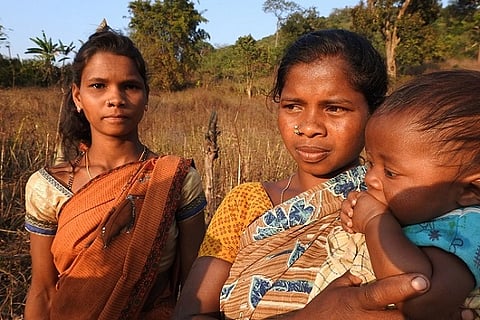

In the Eastern Ghats of Andhra Pradesh’s tribal region, there are several hamlets, nestled deep in the hills, some of which require at least 4-5 hours of trekking to reach. These hamlets have no motorable roads, which means that locals will have to trek to the nearest motorable road by foot.
For the women living in these hamlets, dealing with pregnancy turns into a nightmare, with most of them delivering babies within their homes. And for them, change is still far away. A testament to this ordeal is data suggesting that the state of maternal healthcare in the tribal belt is dismal.
According to the Integrated Tribal Development Agency (ITDA) office at Paderu town in the tribal region, the Maternal Mortality Rate (MMR) under its jurisdiction for 2018 up to January 2019 was 204. This is shocking when compared to Andhra Pradesh’s rate between 2014 to 16, which stands at 74 or India’s rate which stands at 130.
In September last year, a group of adivasis belonging to Maasika Valasachintala, a hilltop hamlet with no road connectivity in Vizianagaram district, decided to document their ordeal on camera. 24-year-old Mutthaiama was forced to deliver her baby on a treacherous dirt path while being carried on a handmade stretcher.
As far as ensuring safe deliveries in concerned, the state government relies on two things, Asha workers and Auxillary Nurse Midwives (ANMs).
While Asha workers are picked from the same villages, ANMs are more trained at handling such cases. However, some ANMs are in charge of at least 25 to 30 hamlets and can manage to visit each hamlet only once or twice a month.
Dr Hemalatha, the Superintendent of Victoria General Hospital (VGH) in Visakhapatnam, points out that the problem is a social one. “In most cases, the women are illiterate and so are the husbands. They may already have one or two children. How can one expect her to leave all that and get admitted? They are not willing to do so because it is difficult to manage. There is also a fear as to how uneducated persons like them can come to the town and stay,” she explains.
According to DK Balaji, Project Officer ITDA, Paderu, the most important reason is a lack of awareness among the tribal women, with many getting married very early and expecting a second or third child by the age of 19 or 20.
Even while authorities insist that women get admitted in advance, the hospitals themselves aren’t equipped to handle all pregnancy cases. Until recently, a local hospital in Chinthapalle had shortage of beds and staff, with two patients having to share one bed in some cases.
One possible solution for this, according to Dr Hemalatha, is having a gynaecologist and an anaesthetist and a blood bank facility in the CHCs. Constructing a maternity hospital or a medical college in Araku or Paderu would also go a long way in improving the situation.
Watch: